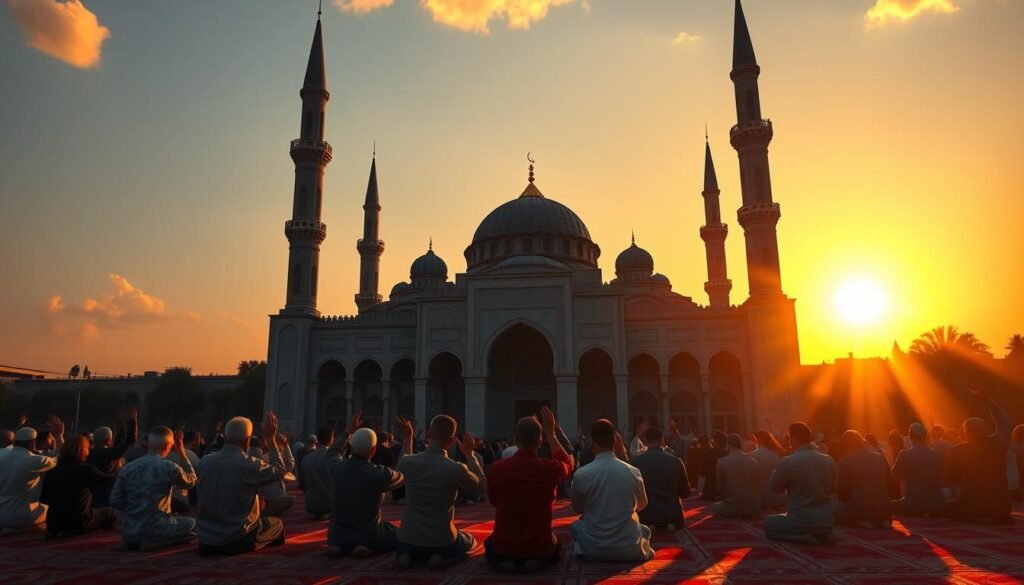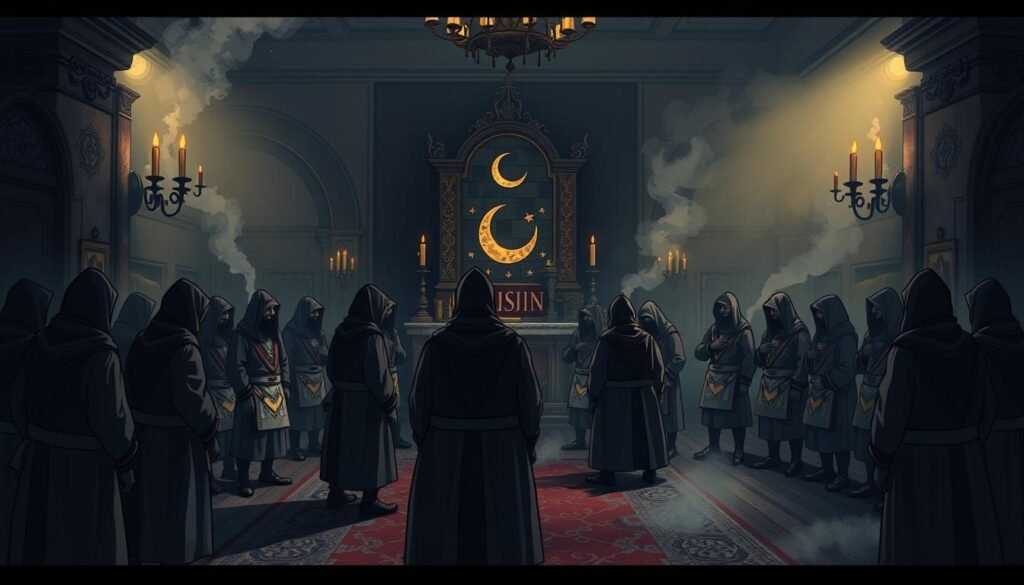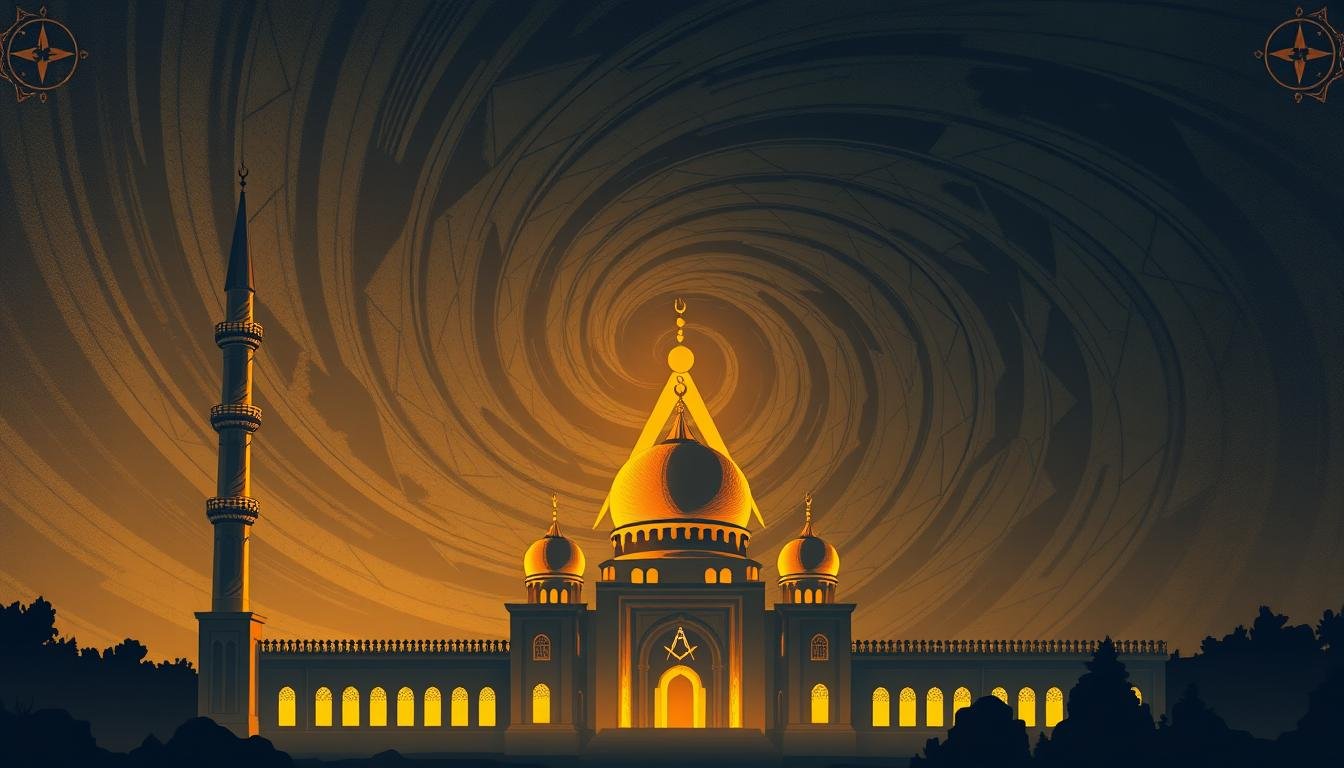As a Muslim, you might wonder about the mix of faith and tradition. The question of joining Freemasonry is a big deal. It’s a choice that touches your soul.
In 1717, Freemasonry started as a group with deep roots. Early travelers in the Muslim world found Sufi brotherhoods interesting. They shared secrets and wisdom, like Masons.
But today, this mix is hard for Islam. In 1908, Masonic Acacia magazine said no lodge can exist without Jewish members. This makes people question if Freemasonry is really neutral.
Islam believes in one God and doesn’t like secret rituals. The 1903 World Masonic Conference called lodges places of worship. This goes against Islamic teachings. Some Muslims see joining Freemasonry as a big mistake.
But, the debate goes on. Why do some Muslims want to join Freemasonry, knowing the risks?
In 2023, the FBI stopped a plot against a Masonic building in Milwaukee. This shows the ongoing problems. El-Azhar’s 1978 fatwa said Freemasonry is bad for faith. This article looks into history, beliefs, and today’s issues. It helps you think: Can a Muslim join Freemasonry?
Understanding Freemasonry: Origins, Principles and Modern Practices
Freemasonry has roots that go back centuries. It mixes practical skills with deep thoughts. Today, it has over 6 million members worldwide, united by brotherhood and growth.
Its rituals and symbols are often seen as secret. But they teach us about personal growth. For Muslims, understanding Freemasonry is key to knowing if it fits with their faith.
“Freemasonry was a brotherhood uniting diverse individuals under shared ideals of progress and sacred values.”
The Historical Development of Freemasonry
Freemasonry started with medieval stonemasons. It became official in 1717 in London. It then spread to Europe and America, growing in the 19th century.
It was a place for Muslim thinkers during colonial times. The opening of the Suez Canal in 1869 made it even more influential in cities like Cairo and Calcutta.
Core Masonic Values and Beliefs
Masons believe in a higher power. They welcome people of many faiths, except for some Christian groups. They focus on charity and personal growth.
But, some wonder if these values match Islamic teachings. There’s a debate about this.
Rituals and Symbols in Masonic Traditions
Masons use symbols like the square and compass to teach. Their rituals show spiritual growth. But, some see these as secrets that don’t fit with Islamic views on faith and rituals.
Islamic Faith Fundamentals: Monotheism and Religious Devotion
At the heart of Islam is tawhid in Islam—the belief in Islamic monotheism. This idea says Allah is the only God, with no others beside Him. The Quran clearly says, “Say, He is Allah, the One” (112:1), showing we should only worship Him.

Islamic religious devotion comes from this belief in one God. Actions like prayer and giving to charity show our commitment to core Islamic beliefs. These acts help us follow God’s will, without idols or mixing beliefs.
“Allah—there is no deity except Him, the Ever-Living, the Sustainer of [all] being.” (Quran 2:255)
This verse shows how deep tawhid’s meaning is. Keeping faith pure is key when looking at things like Freemasonry against Islamic monotheism. Experts say keeping devotion true is vital to keep faith strong.
Can a Muslim Be a Freemason? Religious and Ethical Considerations
I explore the complex interplay between faith and Freemasonry. Some Muslims have joined Freemasonry, like in 18th-century Indonesia. But, this choice is debated due to core Islamic principles.
Tawhid, the Islamic belief in one God, clashes with Masonic universalism. This blurs religious lines, raising ethical questions.
Potential Conflicts with Islamic Monotheism (Tawhid)
The Quran says there is no God but Allah. This contradicts Freemasonry’s view of a “Great Architect.” Scholars say this could weaken Islam’s strict monotheism.
Oaths and Allegiances: Islamic Perspective
Islamic law bans oaths that go against faith. Freemasonry’s vows of loyalty are a concern. Scholars like Ibn Taymiyyah say these oaths are against Quranic teachings.
Secret Societies in Islamic Teaching
Secret societies, like Dutch East Indies Freemasonry, pose risks. They can manipulate power. The Quran warns against such divisions.
Scholars debate if Masonic secrecy violates Islamic values of openness.
Masonic Rituals That May Contradict Islamic Principles

Exploring the link between Masonic rituals and Islam shows deep complexity. Both traditions value brotherhood but differ fundamentally. We’ll look at how symbols, oaths, and practices conflict with Islamic teachings, all while respecting cultural differences.
“You can see Islamic influence in the Shriners’ red fezzes. Freemasons used Islamic imagery to blend Christianity, Islam, and Eastern beliefs.”
The Concept of Brotherhood in Both Traditions
In Islam, ukhuwah (brotherhood) is about shared faith and obeying Allah. Freemasonry’s brotherhood, though, is through oaths that might challenge Islamic loyalty to God. Even good deeds in Masonic rituals and Islam settings are questioned due to non-Islamic symbols.
Symbolic Elements and Their Religious Implications
Tools like the square and compass have Islamic art’s geometric patterns but carry different meanings. Islamic law bans idolatry, making any symbol suggesting devotion to something other than Allah a violation of monotheism. The Shriners’ fezzes, while looking Islamic, are part of a system that questions core beliefs.
Ceremonial Practices and Islamic Law (Sharia)
Freemasonry’s secret oaths and rituals of resurrection challenge Sharia’s clear teachings. Scholars say these acts, though not evil, blur faith and innovation lines. The Quran stresses direct devotion to Allah, leaving no room for symbolic intermediaries.
Understanding these tensions requires balancing history with scripture. How do we reconcile borrowed symbols with divine commands? This question is key in today’s debates.
Positions of Major Islamic Authorities on Freemasonry
Islamic scholars say Freemasonry goes against Islamic teachings. Places like Egypt’s Al-Azhar and Saudi Arabia’s Permanent Committee for Islamic Research say it’s haram. They point out Freemasonry’s secrecy and how it seems to go against the idea of one God.
They see Masonic oaths and symbols as similar to Islamic teachings about deception. Most Sunni and Shia leaders agree it’s forbidden. Even some who think modern lodges might be different, don’t change the main rule.
Freemasonry’s secrecy fosters doubt about its true aims, which Islam rejects. —Fatwa from the Islamic Fiqh Academy
For more on Islamic views on modern issues, check out this link. Scholars say secrecy is against Islam’s values of openness. Freemasonry is rare in Muslim countries, showing these views are strong. Islamic leaders keep saying faith is more important than secret groups.
Muslim-Majority Countries and Their Stance on Masonic Lodges
Freemasonry’s journey in Muslim-majority areas shows a mix of rules and exceptions. These rules come from history and beliefs.
In the West, joining a Freemason lodge was often seen as a way of getting back in touch with spirituality. But for lodges in the East, of which there were many, being a Freemason was seen as a means of tapping into currents of progress and globalization.
Historical Bans and Restrictions
Early Masonic lodges started in Ottoman lands in the 18th century—like Turkey’s first lodge in 1721—yet political crackdowns soon followed. By 1876, Turkish lodgeses operated clandestinely until 1962. Egypt banned Freemasonry entirely in 1964 after a scandal involving an Israeli spy, closing all lodges by 1965. Source data shows how Freemasonry in Muslim countries faced backlash tied to anti-colonial sentiment and fears of foreign influence.
Contemporary Legal Status Across the Islamic World
Today, banned Masonic lodges are common in most Arab states. Only Lebanon and Morocco allow lodges legally—Morocco’s Grand Lodge, chartered in 1999, operates under French Masonic ties. In contrast, Saudi Arabia imposes prison terms for membership, while Iran’s lodges were “effectively destroyed” post-1979 revolution. The Freemasonry legal status in Islamic nations depends on regional power dynamics more than uniform religious rulings.
Case Studies: Egypt’s 1964 ban followed a scandal tying Masonic ties to espionage, while Turkey’s lodgeses rebounded after 1962 to now host 17,000 members. Indonesia’s more lenient stance contrasts with strict bans in Gulf states, illustrating how pluralism shapes policy. These examples show how Freemasonry’s presence—whether banned or tolerated—remains tied to national identity struggles more than theology alone.
Misconceptions About Muslims in Freemasonry
Myths about Muslim Freemasons myths mix truth and lies. Many think Muslim Masonic membership goes against Islam. But, history shows a more complex story. Lodges in Aden (1850) and Palestine (1873) had Muslim members without big problems.
Yet, myths say Freemasonry is against Islam or supports Zionism. These misconceptions about Islamic Freemasonry ignore common values like brotherhood and justice. Research by W. Bro. Shaikh Hatim shows Masonic ethics can match Islamic values.
Conspiracy theories spread in both Muslim and Western worlds. Claims of Masonic control over politics or ties to Zionism are based on false texts like Protocols of the Elders of Zion. Even Hamas’ 1988 charter linked Rotary Clubs to Masonic threats, spreading more lies.
Also, Egypt’s 1950s crackdown on lodges was due to nationalism, not just theology. By 1965, Egypt closed fourteen English lodges. But Morocco’s 2000 Grand Lodge shows a different path: GLNF’s three lodges operate legally, blending tradition with modernity.
Media like The Simpsons episodes share simple stories that shape public views. These stories hide the real truth. Islamic scholars like the IJC call Freemasonry “clandestine,” but history shows many Muslims joined for social reform, not secret plots.
We need to separate real concerns from false rumors to start real talks. By tackling these Muslim Freemasons myths, we can have better discussions about faith and brotherhood in Section 9.
Notable Muslims Who Have Been Associated With Freemasonry
Islamic teachings often say no to Freemasonry. Yet, history and today’s stories show some Muslims walked this tightrope. Their tales mix faith and fraternal bonds in complex ways.
Historical Figures and Their Experiences
William Henry Quilliam, a British Muslim convert in 1887, is a key figure. He was a Mason before Islam, joining lodges like Alliance Lodge No. 667. His life as a Muslim Mason sparked many debates.
Walter M. Fleming was initiated by an Arabian diplomat in the 1870s. This shows Masonic rituals and Islamic figures sometimes met. But, his exact Masonic ties are unclear.
Contemporary Examples and Their Justifications
Today, Muslim Masons have complex reasons for their choice. Abdullah Quilliam, William’s son, followed his father’s Masonic path. Some scholars see Freemasonry’s charity as matching Islamic values.
Yet, the Nation of Islam, linked to Marcus Garvey’s Masonic ideas, uses Islamic symbols. They see Masonry as a way to balance cultural identity with brotherhood.
Reception by Both Communities
Most Islamic scholars say no to Freemasonry, seeing its oaths as against tawhid. Masonic groups rarely talk about religious concerns. They focus on being inclusive instead.
Quilliam’s legacy is debated. Some see him as a pioneer in interfaith dialogue. Others say he compromised his faith. His story highlights the ongoing debate on faith and personal goals.
FAQ
Are there any Islamic texts that explicitly prohibit Freemasonry?
What are the main beliefs and practices that define Freemasonry?
How do Islamic scholars view the concept of oaths in Freemasonry?
Is Freemasonry considered a religion?
What historical connections exist between Freemasonry and Islamic practices?
How do different Muslim-majority countries regulate Freemasonry?
Are there misconceptions about Freemasonry within Muslim communities?
Who are some notable Muslims associated with Freemasonry, and what were their motivations?
What does the term "ukhuwah" mean in Islam, and how does it relate to Freemasonry?
How do conspiracy theories regarding Freemasonry affect Muslim perceptions?

Embracing Faith, One Insight at a Time!
The teachings of the Quran have always guided my path. With a deep passion for Islamic knowledge, I strive to blend the wisdom of tradition with the relevance of today, making the timeless messages of Islam accessible and meaningful for everyone.
Muslim Culture Hub is my platform to share historical insights and thought-provoking articles, exploring both well-known and lesser-discussed aspects of Islamic culture and beliefs. My mission is to create an inclusive online space where everyone can learn, strengthen their faith, and connect with the profound message of Islam.
Join the journey!
May peace be upon you.








